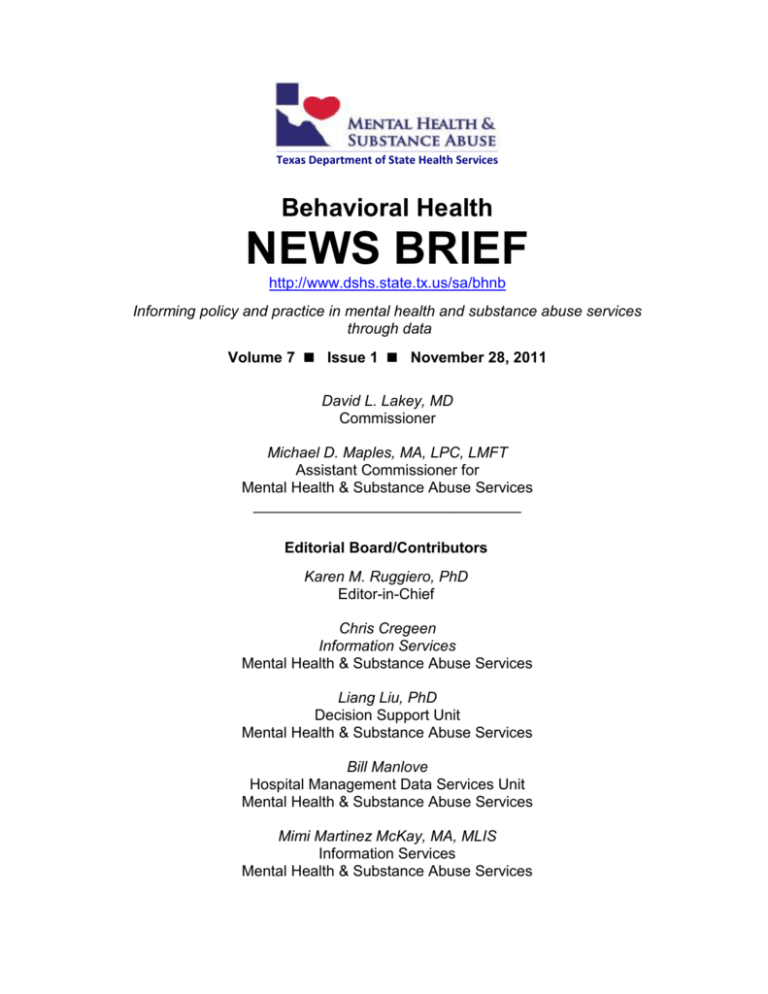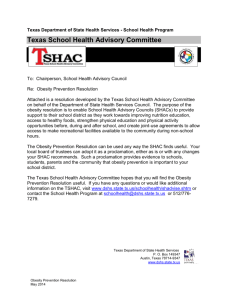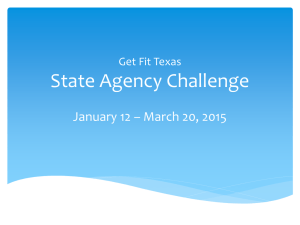bhnb_v7-1r-508 - Texas Department of State Health Services
advertisement

_________________________________________________________________________________________________________________________________________________________________________________ Texas Department of State Health Services Behavioral Health NEWS BRIEF http://www.dshs.state.tx.us/sa/bhnb Informing policy and practice in mental health and substance abuse services through data Volume 7 Issue 1 November 28, 2011 David L. Lakey, MD Commissioner Michael D. Maples, MA, LPC, LMFT Assistant Commissioner for Mental Health & Substance Abuse Services ________________________________ Editorial Board/Contributors Karen M. Ruggiero, PhD Editor-in-Chief Chris Cregeen Information Services Mental Health & Substance Abuse Services Liang Liu, PhD Decision Support Unit Mental Health & Substance Abuse Services Bill Manlove Hospital Management Data Services Unit Mental Health & Substance Abuse Services Mimi Martinez McKay, MA, MLIS Information Services Mental Health & Substance Abuse Services Chad Pomerleau Contract Administration and Quality Support Contract Oversight and Support Services Section Ross Robinson, MA, MBA Program Services Section Mental Health & Substance Abuse Services Alan Shafer, PhD Decision Support Unit Mental Health & Substance Abuse Services Sam Shore, MSSW Mental Health Transformation and Behavioral Health Operations Mental Health & Substance Abuse Services DSHS Behavioral Health NEWS BRIEF Volume 7 Issue 1 November 28, 2011 2 IN THIS ISSUE North Texas State Hospital Wins 2011 David Pharis Award for Excellence in Hospital Quality Improvement ……………...................................................... 4 Positive Performer: Unlimited Visions Aftercare, Inc. …………….................... 4 The Mental Health & Substance Abuse Division: Recovery Via Hope ………………..……….……………………………….…………. 5 Question from the Assistant Commissioner for Mental Health and Substance Abuse Services: “What have you done for clients today using data?” Answer: Mary Sowder (Program Specialist, Mental Health Transformation and Behavioral Health Operations) ……..............................................................7 What the Research Literature Teaches Us: Peer Mentoring Can Reduce Psychiatric Hospital Readmissions ……………... 8 Peer Mentoring Can Increase Outpatient Treatment Attendance …….………… 8 Upcoming Events …………………….………………………………………………... 9 Clinical Management for Behavioral Health Services (CMBHS) Project Update ……………….................................................................................11 DSHS Behavioral Health NEWS BRIEF Volume 7 Issue 1 November 28, 2011 3 North Texas State Hospital Wins 2011 David Pharis Award for Excellence in Hospital Quality Improvement North Texas State Hospital is the winner of the 2011 David Pharis Award for Excellence in Hospital Quality Improvement. The award is named for David Pharis, a court-appointed monitor who oversaw changes in the Texas public mental health system that stemmed from a 1974 class-action lawsuit. In 2009, the State Hospital Section within the Mental Health & Substance Abuse Division at the Texas Department of State Health Services (DSHS) recognized Pharis’ efforts by establishing the David Pharis Award to honor his memory and to help ensure that his excellent work towards improving the quality of patient care continues. Texas Society of Psychiatric Physicians ©. Texas Society of Psychiatric Physicians Annual State Conference, Dallas, Texas, November 2011. From left to right: Eric Shelton (Director of Client Services and Rights/Peer Specialist Administrative Supervisor, North Texas State Hospital); Jeff Beardon (Director of Forensic Psychiatric Programs, North Texas State Hospital); Barbara Wiebe (Drama Therapist/Peer Specialist Clinical Supervisor, Behavior Management Treatment Program, North Texas State Hospital); James Smith (Superintendent, North Texas State Hospital); and Dr. Emilie Becker (Medical Director for Behavioral Health, DSHS). DSHS and the Texas Society of Psychiatric Physicians presented the 2011 award to North Texas State Hospital for their Recovery Model of Care Program. The program was recognized for making significant contributions to the safety and quality of inpatient care and outcomes. Peggy Perry, Director of the State Hospital Section at DSHS commended the program for applying “…the concepts of consumer choice and a recovery orientation to treatment in ways to create success and add value to the person’s experience in the Maximum Security Program at North Texas State Hospital.” The award was presented to Superintendent James Smith and program staff by Dr. Emilie Becker, Medical Director for Behavioral Health at DSHS, during the Texas Society of Psychiatric Physicians Annual State Conference in November 2011 in Dallas. POSITIVE PERFORMER Unlimited Visions Aftercare, Inc. Providers of substance abuse treatment funded by the Texas Department of State Health Services (DSHS) are tasked with ensuring that clients in their care complete treatment, achieve abstinence, and are successfully contacted for a follow-up interview 60 to 90 days after being discharged. However, beginning in Fiscal Year (FY) 2011, DSHS-funded substance abuse treatment providers must also ensure that more specific outcomes are achieved according to the client’s age and the type of service they received. The intensive residential substance abuse treatment program for youth is an example. In addition to the traditional measures of treatment completion, abstinence, and follow-up, FY2011 DSHS Behavioral Health NEWS BRIEF Volume 7 Issue 1 November 28, 2011 4 contracts stipulate that 85% of clients who complete the intensive residential substance abuse treatment program for youth will not have been arrested since admission and will be attending school or vocational training upon discharge. Statewide, 93% of youth who completed this treatment program had not been arrested and 82% were attending school or vocational training at discharge during FY2011. One provider, though, has earned distinction by exceeding both the DSHS contract targets and statewide averages. At Unlimited Visions Aftercare, Inc., 100% of youth who completed the intensive residential substance abuse treatment program had not been arrested since admission and 98% were attending school or vocational training at discharge in FY2011. Well done Unlimited Visions Aftercare! The Mental Health & Substance Abuse Division: Recovery Via Hope In 1999, the U.S. Surgeon General published a report on mental health in America, declaring that mental health is part of overall health, mental illnesses are real, mental illnesses are as treatable as physical health disorders, and the focus of treatment should be on recovery. In 2001, President Bush established the New Freedom Commission on Mental Health to address the problems in the current mental health service delivery system. The federal Mental Health Transformation Grant emerged from the findings of this commission. Texas was awarded funds, with the charge to transform the public mental health system. The Consumer and Family Voice Subcommittee of the Transformation Working Group created the Via Hope Texas Mental Health Resource, a training and technical assistance center in 2008. Via Hope is supported by the Mental Health and Substance Abuse Block Grant and a grant from the Hogg Foundation for Mental Health, with Mental Health America of Texas and the National Alliance on Mental Illness-Texas serving as fiscal agents. Via Hope works with the Mental Health & Substance Abuse Division at the Texas Department of State Health Services (DSHS), along with provider organizations, consumers, peers, and other stakeholders, to promote mental health transformation through: Provision of innovative training and technical assistance initiatives designed to change the traditional mental health system; Development of a system that is recovery-oriented, strengths-based, and person centered; and Use of best practices, promising practices, and a variety of diffusion of innovation frameworks. Via Hope emerged from concept to formal operations with robust programs in place in less than four years. Via Hope staffs work with an advisory board comprised of consumers, family members, and practitioners. The Center for Social Work Research at The University of Texas at Austin, which provides program evaluation on a number of Via Hope initiatives, also forms part of the Via Hope advisory board. Via Hope currently supports six main initiatives critical to the advancement of Mental Health & Substance Abuse Division’s vision of hope, resilience, and recovery for everyone. DSHS Behavioral Health NEWS BRIEF Volume 7 Issue 1 November 28, 2011 5 Certified Peer Specialist Training — for individuals who have been diagnosed with a mental illness, are in recovery, and use their life experiences to assist other individuals with their own recovery. Since the program’s inception in 2010, there are over 180 Certified Peer Specialists trained in Texas, and many work at State Mental Health Hospitals and DSHS-funded Local Mental Health Authorities. Family Partner Certification — a new training and certification offered by Via Hope. Family Partners are individuals with experience parenting a child with mental, emotional, or behavioral health disorders who have learned how to work with the public mental health system, and can share this understanding with another parent or family member. The curriculum was developed by Via Hope through intense work with state, regional, and national stakeholders. Youth Outreach — supports programs for youth. Youth focus groups have been held in order to build the foundation for the Youth Outreach program. Youth developed a weekend youth advocacy retreat to learn how to advocate for themselves and others, how to support an individual with mental health issues, and to learn more about mental health in general. The youth initiative provides support to student leaders of mental health awareness groups on college campuses to strengthen the youth voice. Statewide Consumer Engagement — strengthens the administrative, fiscal, and leadership capabilities of the seven consumer operated service providers that receive funding from the Mental Health & Substance Abuse Division. These organizations are partners with DSHS-funded Local Mental Health Authorities and are governed and operated by consumers. In addition, Via Hope will also provide support and facilitation for the Texas Catalyst for Empowerment, a consumer-led advocacy group. Learning Communities — Via Hope and the Center for Social Work Research at The University of Texas at Austin partnered to develop the 2011 (Peer Specialist) and 2012 (Recovery Focused) learning communities. Fundamental to these learning communities is the Learning Model (Institute for Healthcare Improvement/IHI, 2003) combined with the Model for Improvement (Langley et al., 1996). Both models provide programmatic structure that allows for deep learning through the use of expert mentors, and the development of a shared learning community. The models can be used for projects that have very specific outcomes, or those, like Via Hope Learning Communities, that are more qualitative in nature. Collectively, the organizations that have participated in the learning community process have begun to demonstrate progress in terms of recovery-focused work. There is still work to be done, both within the organizations that participated in these projects and within the Texas public mental health system, as a whole. Recovery Institute — Building on the lessons gleaned from the Learning Communities, the Recovery Institute is designed to promote, foster, and implement recovery-based activities, such as person-centered recovery planning. The Recovery Institute will be a year long intensive effort to engage provider organizations in a variety of recovery-focused activities, from webinars and conference calls to much more in-depth and application-based activities, such as a leadership academy and the DSHS Behavioral Health NEWS BRIEF Volume 7 Issue 1 November 28, 2011 6 person-centered recovery planning effort. In addition to Via Hope staff, the Recovery Institute will be supported by outstanding faculty from the field of recovery-focused, transformational practice. Clearly, the success of Via Hope lies in its ability to be a nimble, change-oriented, learning program that is steadily advancing the Mental Health & Substance Abuse Division’s vision of hope, resilience, and recovery for everyone. ___________ Institute for Healthcare Improvement/IHI. (2003). The breakthrough series: IHI’s collaborative model for achieving breakthrough improvement. IHI innovation series white paper. Boston, MA: Institute for Healthcare Improvement/IHI. Langley, G.J., Nolan, K.M., Norman, C.L., Provost, L.P., & Nolan, T.W. (1996). The improvement guide: A practical approach to enhancing organizational performance. San. Francisco, CA: Jossey-Bass. QUESTION FROM THE ASSISTANT COMMISSIONER FOR MENTAL HEALTH AND SUBSTANCE ABUSE SERVICES: “What have you done for clients today using data?” ANSWER: Mary Sowder (Program Specialist, Mental Health Transformation and Behavioral Health Operations) I coordinate the submission of the Mental Health and Substance Abuse Block Grant application and related reports for the federal Substance Abuse and Mental Health Services Administration (SAMHSA). The Block Grant application requires that we document how we develop our priorities, goals, and objectives for the state community mental health and substance abuse service delivery system. These priorities, goals, and objectives must be data-driven. Data that is used includes information that supports our current service delivery system, but also includes need assessments, trends, and projections that may impact our future service delivery system. Reports are also submitted to SAMHSA that show the extent to which we achieved our goals and objectives during the previous year. Now, how does all of this relate to clients? Once our Block Grant application and reports are approved by SAMHSA, funds are awarded to Texas and used to pay for client services in local communities. For the 201213 Block Grant application that was just submitted, SAMHSA requested that we also include “dashboards” that will benchmark our performance in key areas, such as client access to services, national outcome measures, and so on. SAMHSA is considering an Tanya Guthrie ©. DSHS Behavioral Health NEWS BRIEF Volume 7 Issue 1 November 28, 2011 7 incentive program for states based on dashboard performance. The Texas dashboards were created by the Decision Support Unit, and depending on how well we meet the benchmarks, our state could possibly receive some type of incentive that could, hopefully, be directed toward Texans in need of community mental health and substance abuse services. As you can see, data is the foundation of the whole Block Grant process, and without it, we would not be successful in securing these critical funds. Data Rocks! WHAT THE RESEARCH LITERATURE TEACHES US Peer Mentoring Can Reduce Psychiatric Hospital Readmissions Peer support services for adults with serious mental illness continue to be developed at a rapid rate. Peer support services are provided by individuals who are themselves in recovery from a serious mental illness. Moreover, peer support is an important component of the transformation of mental health services to a recovery orientation, as called for in the 2003 report of the President’s New Freedom Commission on Mental Health. Despite the rapid development and importance of peer support services for recovery, research on their effectiveness has lagged behind. In an effort to make up for this research lag, William Sledge, M.D., in the Department of Psychiatry at Yale University’s School of Medicine, and his colleagues examined the effectiveness of peer support for reducing psychiatric hospital readmissions among persons with serious mental illness. A total of 74 adults who were diagnosed with a serious mental illness and had been hospitalized three or more times in the past 18 months were randomly assigned to receive usual care (n = 36) or a peer mentor + usual care (n = 38). The peer mentors in the study were themselves in recovery from a serious mental illness, received training and supervision from mental health professionals, and used their first-hand experiences as a basis from which to provide support. The frequency of peer mentor contacts was determined in collaboration with mentees. All participants were then assessed nine months later. The results of the study, published in the May 2011 issue of the journal Psychiatric Services, showed that participants who had been assigned a peer mentor along with usual care had significantly fewer psychiatric hospital readmissions and significantly fewer hospital days, compared to those who had only received usual care. These findings suggest that peer mentoring can reduce psychiatric hospital readmissions among people with serious mental illness. ___________ Sledge, W.H., Lawless, M., Sells, D., Wieland, M., O’Connell, M.J., & Davidson, L. (2011). Effectiveness of peer support in reducing readmissions of persons with multiple psychiatric hospitalizations. Psychiatric Services, 62(5), 541-544. Peer Mentoring Can Increase Outpatient Treatment Attendance Continuity of care from hospital to outpatient settings is vital for recovery from both serious mental illness and substance abuse. Yet, people dually diagnosed with serious mental illness and a substance use disorder often miss outpatient treatment appointments after being hospitalized multiple times. One way to possibly increase outpatient treatment DSHS Behavioral Health NEWS BRIEF Volume 7 Issue 1 November 28, 2011 8 attendance is through peer mentoring. Kathlene Tracy, Ph.D., and her associates, examined this possibility in a study published this month in the American Journal of Drug and Alcohol Abuse. All 96 participants were veterans who had been hospitalized two or more times in the past year at a Veterans Administration hospital. They were assigned for 8 weeks to one of three conditions, chosen at random: 1) ‘treatment as usual’ (n = 29); 2) ‘treatment as usual’ + peer mentoring (n = 39); or 3) ‘treatment as usual’ + peer mentoring + dual recovery treatment (n = 28). ‘Treatment as usual’ included case management, medication management, and group skills training. In Tracy et al.’s study, peer mentoring involved one-on-one support provided by trained individuals who were themselves in recovery, along with weekly group meetings run by a peer mentor and supervised by a clinician. Dual recovery treatment consisted of a time-limited case management program with twice weekly sessions declining to once weekly sessions plus individual and group skills training. The researchers then examined the attendance records of participants for mental health, substance abuse, and medical appointments 3, 6, 9, and 12 months after being discharged from the hospital. Participants who received ‘treatment as usual’ + peer mentoring were just as likely to attend outpatient treatment as those who also received dual recovery treatment. In fact, participants in both of these conditions had better outpatient treatment attendance than did those who only received ‘treatment as usual’. In addition to the previous article’s suggestion that peer mentoring is effective for reducing psychiatric hospital readmissions, these results suggest that peer mentoring can also increase outpatient treatment attendance among individuals dually diagnosed with a serious mental illness and a substance use disorder and who have had repeated hospitalizations. ___________ Tracy, K., Burton, M., Nich, C., & Rounsaville, B. (2011). Utilizing peer mentorship to engage high recidivism substance-abusing patients in treatment. American Journal of Drug and Alcohol Abuse, 37(6), 525-531. UPCOMING EVENTS November is Lung Cancer Awareness Month (http://www.lungcanceralliance.org/involved/lcam_month.html). November 30-December 1 is the Texas Department of State Health Services (DSHS) Council Meeting, Board Room (M-739), Robert D. Moreton Building, 1100 W. 49th Street, Austin, Texas (http://www.dshs.state.tx.us/council/meeting-dates.shtm). December is National Drunk and Drugged Driving Prevention Month (http://www.nhtsa.gov/Driving+Safety). December 1 is World AIDS Day (http://www.worldaidscampaign.org/en/). December 2 is the deadline for presentation submissions for the Texas Behavioral Health Institute. Save the dates: July 16-20, 2012 for the Texas Behavioral Health DSHS Behavioral Health NEWS BRIEF Volume 7 Issue 1 November 28, 2011 9 Institute, Austin Convention Center, Austin, Texas. For more information please see the Institute website (http://www.texinstitute.com/). December 2 (9am-12noon) is the Mental Health Planning and Advisory Council (MHPAC) Meeting, Texas Department of State Health Services, Board Room (M-739), Robert D. Moreton Building, 1100 W. 49th Street, Austin, Texas (http://www.dshs.state.tx.us/mhpac/11meetings.shtm). December 2 (1:30-5pm) is the Texas Mental Health Transformation Work Group (TWG) Meeting, Texas Department of State Health Services, Board Room (M-739), Robert D. Moreton Building, 1100 W. 49th Street, Austin, Texas (www.mhtransformation.org/events.asp). December 6 is the Texas Recovery Initiative Task Force Meeting, Dr. Ijeoma Achara, guest speaker (http://www.dshs.state.tx.us/sa/texasrecoveryinitiative/default.shtm). December 7-9 is the 57th Annual Texas Vital Statistics Conference, Renaissance Hotel, Austin, Texas http://www.dshs.state.tx.us/vs/field/The-57th-Annual-Texas-Vital-Statistics-Conference/. January 22-24 is the Texas Initiative for Program Success and Sustainability (TIPSS) Leadership Summit, Doubletree-Austin North, 6505 IH-35 North, Austin, Texas (http://events.r20.constantcontact.com/register/event?oeidk=a07e3q34rhz4a189d9b&llr= dr49r9bab) February 12-18 is Children of Alcoholics Week (http://www.nacoa.org/). February 22-23 is the DSHS Council Meeting, Board Room (M-739), Robert D. Moreton Building, 1100 W. 49th Street, Austin, Texas (http://www.dshs.state.tx.us/council/meetingdates.shtm). February 26-March 3 is National Eating Disorders Awareness Week (www.nationaleatingdisorders.org/programs-events/nedawareness-week.php). February 29 (8:30am-4pm) is the Texans Standing Tall Statewide Summit for Creating Healthier and Safer Communities, Seaton Family of Hospitals Administration Building, 1345 Philomena Street, Austin, Texas (http://www.texansstandingtall.org/). DSHS Behavioral Health NEWS BRIEF Volume 7 Issue 1 November 28, 2011 10 CLINICAL MANAGEMENT FOR BEHAVIORAL HEALTH SERVICES (CMBHS) PROJECT UPDATE Kevin Davis, CMBHS Business Services Team Leader The Clinical Management for Behavioral Health Services (CMBHS) project leadership team held a retreat on October 7th to discuss Phase Five. Of particular importance at the retreat, was determining the scope of functions to be included in CMBHS for providers of community mental health services funded by the Texas Department of State Health Services (DSHS). The new scope will be to CMBHS Phase Five Timeline replicate in CMBHS many of the functions that providers of DSHS-funded community mental health services currently use in the Client Assignment and REgistration (CARE) system. When the community mental health service functions are fully developed and deployed, DSHS-funded providers Note: All timelines are subject to change. will no longer enter client information into CARE; instead, they will enter it into CMBHS — either through direct online entry or through an electronic data exchange. The functions that will need to be replicated in CMBHS from CARE include: Client Profile; Assessments; Diagnosis; Authorizations; New Generation Medication Reporting; and Mental Health County of Residence and County of Admission. Financial Eligibility Assessment and Enrollment functions will also be included in CMBHS for DSHS-funded community mental health providers in the NorthSTAR program. Finally, it was determined that there will be a function to allow for the consent to release information, so that DSHSfunded providers of community mental health services and DSHS-funded providers of substance abuse services can share information about the same clients. Another outcome of the retreat was the decision to implement additional functions related to Medicaid services. The CMBHS project received additional funds from the federal Centers for Medicare and Medicaid Services for work proposed in an Advanced Planning Document (APD). The APD calls for enhancements to CMBHS that will allow DSHSfunded Medicaid service providers to use CMBHS to authorize and submit payment claims for Medicaid-billable services to the Texas Medicaid Healthcare Partnership (TMHP). DSHS Behavioral Health NEWS BRIEF Volume 7 Issue 1 November 28, 2011 11 Three enhancements are planned. The first will allow DSHS-funded community mental health service providers to authorize Medicaid-billable services, such as case management and rehabilitation, and to submit payment claims through CMBHS to TMHP. Providers will submit claims directly to TMHP, but the service authorization will be done through CMBHS. The second enhancement to CMBHS will allow DSHS-funded providers of Youth Empowerment Services to request authorization for these Medicaid-billable services, receive authorization for services, and submit claims to TMHP. As with DSHSfunded providers of community mental health services, Youth Empowerment Service providers will also have the option of submitting payment claims directly to TMHP, although authorizations will still come from CMBHS. Third, the APD calls for DSHS-funded substance abuse service providers to be able to authorize Medicaid services and submit claims to TMHP through CMHBS. ___________ Feedback, questions, and requests related to the CMBHS project may be submitted at the following link: http://www.dshs.state.tx.us/cmbhs/contactus.shtm. DSHS Behavioral Health NEWS BRIEF Volume 7 Issue 1 November 28, 2011 12








